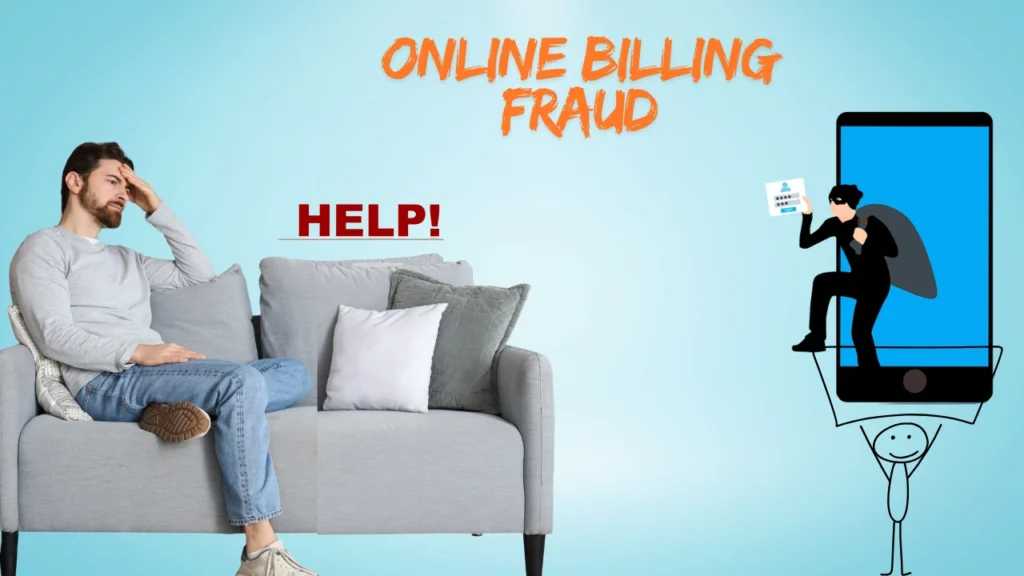Legal Help for Victims of Online Billing Fraud.In the modern era, online transactions have replaced long queues and paper invoices. While this convenience is remarkable, it also carries shadows, one of the darkest being online billing fraud.
Victims often feel bewildered, financially stranded, and unsure about legal recourse. This blog will guide you through the labyrinth of legal help available to victims of such frauds, ensuring you know your rights, options, and potential remedies.
Legal Help for Victims of Online Billing Fraud-Overview
| Article on | Legal Help for Victims of Online Billing Fraud |
| Consumer Protection Laws | Get refunds and compensation |
| Cybercrime Complaint | Trigger police investigation |
| Banking Ombudsman | Reverse unauthorized charges |
| Civil Lawsuit | Recover money through court |
| ADR (Mediation/Arbitration) | Faster, low-cost settlement |
Understanding Online Billing Fraud
Online billing fraud refers to deceitful practices where cybercriminals manipulate digital invoices, charge false amounts, or trick victims into unauthorized payments. It may appear in the form of fake subscription renewals,
hidden service charges, or cleverly disguised phishing emails mimicking authentic companies. These frauds are not minor mishaps as they can cause financial hemorrhage, identity theft, and immense emotional strain. Recognizing the tactics of fraudsters is the first step toward justice.

Why Legal Action is Crucial
Some victims shrug off small fraudulent deductions, assuming they are trivial. However, fraudsters thrive on silence. Reporting even minor frauds builds a shield of deterrence. Legal action not only safeguards your money but also strengthens the collective fight against cybercriminals.
Key Legal Pathways Explained
1. Consumer Protection Mechanisms
Most nations empower consumers through digital-age consumer protection statutes. These laws oblige businesses to ensure transparency in billing. If you notice unexplained charges, you can approach consumer forums to demand refunds, interest, and compensation for mental agony.
2. Cybercrime Complaints
Filing a complaint with a cybercrime cell or national cybercrime reporting portal is pivotal. Fraudulent billing is not just a contractual violation as it is a cyber offense. Authorities can investigate IP addresses, trace the culprits, and prosecute them under cyber laws.
3. Banking Ombudsman & Financial Regulators
Banks often become the first point of failure in fraudulent billing. Victims can lodge grievances with the Banking Ombudsman, a quasi-judicial authority that resolves digital transaction disputes without requiring lengthy litigation.
4. Civil Remedies
Civil lawsuits allow victims to directly sue fraudsters for recovery of amounts lost. Although time-consuming, this route may secure substantial monetary restitution and exemplary damages.
5. Alternative Dispute Resolution (ADR)
For quicker outcomes, ADR methods like mediation and arbitration can resolve billing disputes, especially when fraud involves service providers rather than anonymous hackers.
Preventive and Legal Tips for Victims
Before showing another table, let’s highlight that precaution often complements legal help. Victims who act promptly and smartly strengthen their legal standing.
| Step | Why It Matters | Legal Advantage |
| Freeze Accounts | Stops further unauthorized deductions | Prevents aggravation of financial loss |
| Collect Evidence | Screenshots, emails, SMS, and bank statements | Strong proof in legal proceedings |
| File Cybercrime Complaint | Registers your case officially | Initiates criminal investigation |
| Approach Bank Immediately | Request chargeback or transaction reversal | Quicker monetary recovery |
| Consult a Legal Expert | Professional guidance to choose right forum | Prevents missteps and wasted legal effort |
| Stay Updated on Case | Regularly follow up with agencies or courts | Ensures your case doesn’t stagnate |
International Laws on Online Billing Fraud
Fraud is borderless, and so is the law to combat it. Different countries have enacted frameworks to handle online billing disputes.
| Region/Country | Key Law / Regulation | Main Authority |
| United States | Electronic Fund Transfer Act (EFTA), FTC Rules | Federal Trade Commission (FTC) |
| European Union | Payment Services Directive (PSD2) | European Banking Authority (EBA) |
| India | Information Technology Act, Consumer Protection Act | Cybercrime Cell, Consumer Forums |
| Australia | Australian Consumer Law (ACL) | Australian Competition & Consumer Comm. |
| United Kingdom | Fraud Act 2006, Consumer Rights Act | Action Fraud, Financial Ombudsman |
Psychological & Social Impact of Billing Fraud
It is not just about lost dollars or rupees as victims often face psychological turbulence. Anxiety about future transactions, lack of trust in digital platforms, and fear of recurrence are common. Legal recourse brings not only financial justice but also emotional closure.
The Role of Lawyers in Fighting Billing Fraud
A lawyer specializing in cyber and consumer law becomes a lighthouse for victims navigating murky waters. Lawyers assist by:
- Drafting precise complaints and legal notices.
- Representing clients before cybercrime cells, consumer courts, or civil courts.
- Negotiating settlements through ADR mechanisms.
- Educating clients on preventive digital hygiene.
Final Thoughts
Online billing fraud is not just a technological inconvenience as it is a criminal violation of trust and security. Victims must act swiftly, safeguard evidence, and explore multiple legal remedies. Whether through consumer protection laws, cyber crime authorities, or financial ombudsmen, justice is achievable. Remember: silence feeds fraudsters, action defeats them.
FAQs for Legal Help for Victims of Online Billing Fraud
Can I recover money lost in billing fraud?
Yes, through consumer courts, banks, or civil lawsuits depending on the case’s nature.
Do I need a lawyer to file a cyber crime complaint?
Not always, but legal help ensures accuracy and faster progress.
How soon should I report online billing fraud?
Immediately delays weaken your claim and help fraudsters cover their tracks.
What if the fraudster is overseas?
International cooperation exists; authorities can work with Interpol or cross-border cybercrime units.
Can small fraudulent charges be ignored?
No, fraudsters often test victims with small deductions before bigger scams.
